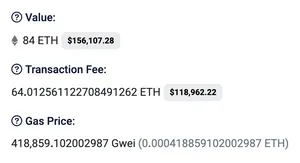A spokesperson stated that the delisting was a reaction to "the most up-to-date regulatory guidance and the latest industry developments". The decision is likely related to mounting industry pressure, and statements from SEC Chair Gary Gensler that most crypto assets are securities.
Citing regulatory concerns, Bakkt delists 25 of 36 crypto tokens on newly acquired Apex Crypto
Binance exits Canada
This is only the latest in a string of events involving regulatory pressure on Binance. In April, Binance canceled the acquisition of the bankrupt Voyager platform by its Binance.US arm, citing a "hostile and uncertain regulatory climate in the US". This move came shortly after a March lawsuit from the US CFTC against Binance and its CEO. Elsewhere, Binance closed its derivatives arm in Australia in April, citing issues with the Australian securities regulator.
Aragon DAO faces governance crisis
In June and October 2022, the Aragon DAO — that is, all holders of the $ANT token or (later) their delegates — voted on several proposals supporting a move to place the Aragon treasury under DAO control. The treasury is a pool of crypto assets currently priced at around $174 million. However, the tokens continued to remain under control of the Aragon Association.
On May 9, 2023, the Aragon Association announced that they would not be following through with the treasury change, and instead would be "repurposing the Aragon DAO into a grants program". They attributed the decision to "coordinated social engineering and 51% attack" on the DAO that began shortly after a small portion of the treasury assets were transferred.
A week before the announcement, Aragon also banned a group of token holders from the group's Discord channel. Aragon characterized the group as appearing "coordinated" and alleged the group was "engaging in harassment". They claimed the group were members of the "Risk Free Value Raiders", which they described as "a sophisticated, well-resourced, and coordinated group of actors that target crypto projects with an imbalance between the value of their token and treasury". They also accused the group and its members of coordinating governance attacks on other DAOs, including Invictus DAO and Mango Markets. Aragon wrote that they believed the RFV Raiders were aiming to "[extract] value from Aragon for financial profit" rather than pursue the DAO's goals of supporting developers building DAO infrastructure.
One of the banned members told a different story, publishing and later taking down a statement in which he claimed that they were trying to get answers to questions about why the Aragon team was so slow to enact the DAO vote. "We find these bans, failure to empower the community with treasury transfers, and overall lack of transparency to be frustrating and against the ethos of both what DAOs are meant to be and what Aragon team members have repeatedly said they stood for. However, these actions have become a common pattern for Aragon," he wrote.
On May 11, Aragon apologized for how they handled the crisis, unbanned the banned Discord members, and announced that they would "keep following a gradual [treasury] transfer approach, making sure it aligns with the mission of the project", but continued to characterize the members as attackers and reiterated that "we won’t stand for hostile and coordinated attacks".
Blockchain-based diamond tracking firm Everledger collapses
Everledger had in the past raised US$37 million in funding. AUD$3 million (~US$2 million) of that funding came from the Australian government's blockchain grants program in 2021.
- "Government and Tencent-backed Aussie blockchain firm collapses", Australian Financial Review
Bittrex files for bankruptcy
Bittrex used to be a much larger presence in the US, enjoying more than 20% of US market share in 2018. It has since dropped to below 1%.
The entity that filed for bankruptcy in the US is Bittrex, Inc., which is separate from Bittrex Global. "This announcement does not impact Bittrex Global, which will continue operations as normal for its customers outside the U.S.," said a Bittrex spokesperson.
Ethereum user pays 64 ETH ($118,000) transaction fee on 84 ETH ($155,000) swap
- Tweet by Whale Alert
- Ethereum transaction on Etherscan
Deus Finance suffers third hack
In the most recent hack, around $7 million was stolen as attackers discovered a vulnerability in the contracts of the DEI token. Some of the attackers were apparent whitehats, who executed the exploit to safeguard the funds until they could be returned to a secure address. As of May 8, $5.5 million of the $7 million stolen had been returned.
Xirtam rug pulls
On September 6, Binance announced that they were working to return the frozen 1,909 ETH to the people who had purchased it in the funding rounds.
WallStreetBets coin tanks 90% after insider dumps holding
The WSB coin launched as an "official memecoin of r/wallstreetbets". The whitepaper explains the token allocation, saying that "It's the fairest launch memecoin you will find with no team allocation and no presale. Just a free airdrop and some coins for the community. 10% of the $WSB supply is reserved as a treasury for the r/wallstreetbets sub to do with as they please. I’m sure they will spend it wisely and definitely not waste it gambling or convincing each other to drink their own urine." Compelling!
The token launched, and quickly achieved a $50 million "market cap". However, on May 3 the token suddenly lost 90% of its value as one of the token creators, "zjz", dumped a massive quantity of the tokens allocated to the team, trading them for 334 ETH (~$635,000).
zjz has claimed that he only sold the tokens because another creator — "WSBMod" — was secretly draining the token by creating huge airdrops and then claiming them for himself. WSBMod, on the other hand, claims that zjz's actions were theft, and has threatened to involve the police and FBI.
Crypto sleuth zachxbt has since gotten involved in the fray, and along with another prominent crypto figure has joined a multi-sig wallet to try to help secure the funds' return without giving any of the creators involved in the dispute unilateral control.
Former OpenSea executive convicted of fraud and money laundering in NFT insider trading case
Chastain was asked to resign by OpenSea in September 2021 after a Twitter user discovered apparent evidence that he had been engaging in insider trades. He was arrested and charged with money laundering in June 2022.
Chastain unsuccessfully argued in his defense that information about which NFTs would be prominently featured on OpenSea wasn't insider knowledge, and "nobody told Nate that he couldn't use or share that information". However, prosecutors argued that attempt to use anonymous accounts to make the trades suggested that he knew what he was doing was wrong.
This case has been described as the first NFT-related insider trading case, and could set a precedent for other similar charges.








